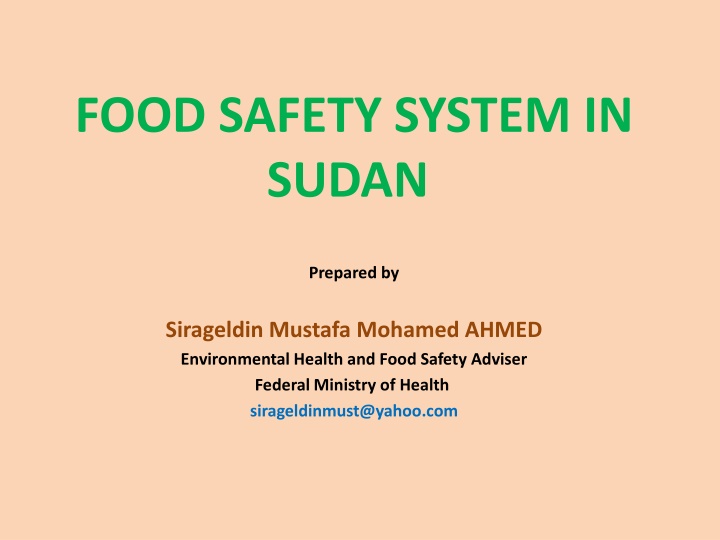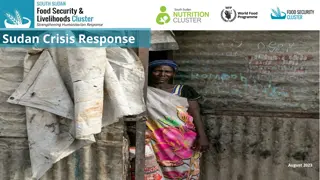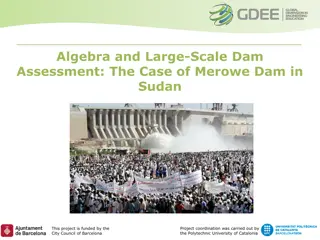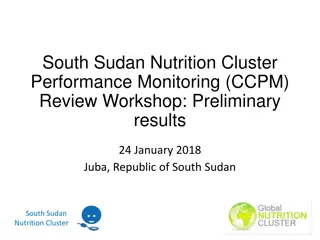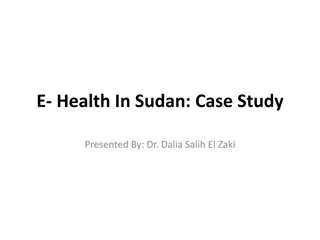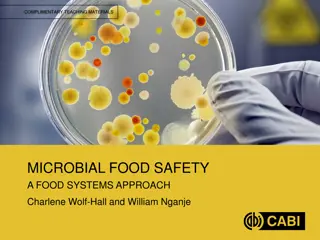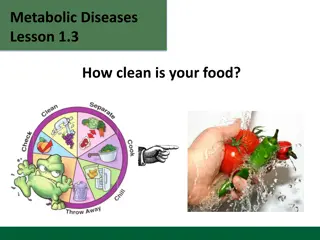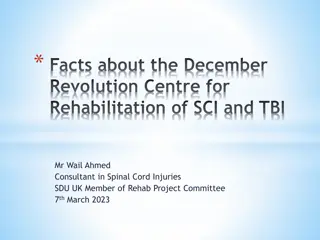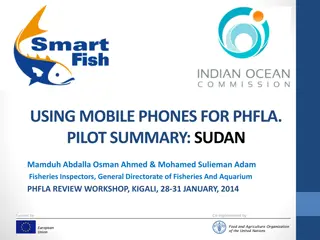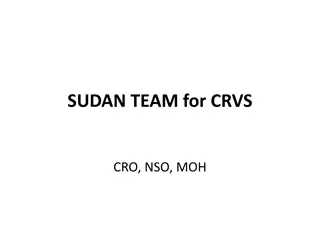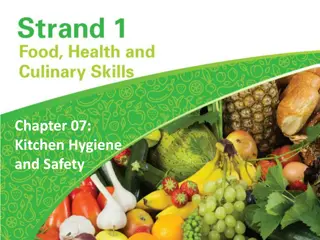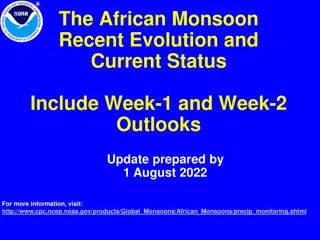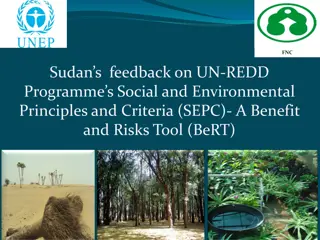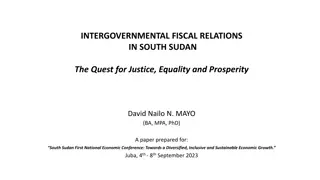Food Safety System in Sudan: Evolution and Current Challenges
Sudan's food safety system is managed by the Federal Ministry of Health through the inspection efforts of Public Health Officers. The evolution of food safety in Sudan has been marked by the reliance on the Public Health Act of 1939. Challenges include the need for improved surveillance of food-borne diseases and laboratory support services to address food hazards.
Download Presentation

Please find below an Image/Link to download the presentation.
The content on the website is provided AS IS for your information and personal use only. It may not be sold, licensed, or shared on other websites without obtaining consent from the author.If you encounter any issues during the download, it is possible that the publisher has removed the file from their server.
You are allowed to download the files provided on this website for personal or commercial use, subject to the condition that they are used lawfully. All files are the property of their respective owners.
The content on the website is provided AS IS for your information and personal use only. It may not be sold, licensed, or shared on other websites without obtaining consent from the author.
E N D
Presentation Transcript
FOOD SAFETY SYSTEM IN SUDAN Prepared by Sirageldin Mustafa Mohamed AHMED Environmental Health and Food Safety Adviser Federal Ministry of Health sirageldinmust@yahoo.com
INTRODUCTION -Sudan covers an area of 1,881,000 square kilometers - It has boundaries with Egypt, Libya, Ethiopia, Eritrea, Central African Republic, Chad and Southern Sudan. -It has a coastline of 835 Km -The only Seaport is Port Sudan located on the Red Sea in the north east
INTRODUCTION +The Capital Khartoum is located in the northern half of the country 1000 km from the sea port The population is 33,419,625 after the separation of the Southern Sudan.
EVOLUTION OF FOOD SAFETY IN SUDAN +- Food inspection in the Federal republic of Sudan is the responsibility of the Federal Ministry of Health (Directorate of Environmental Health and Food Control FOOD CONTROL SECTION) through the Public Health Officers and their assistant i.e sanitary overseers and assistant sanitary overseers. ( 2 years 6 months) - Food inspection is part of the responsibility of Public Health Officers who are also responsible for environmental health services in their specified areas.
EVOLUTION OF FOOD SAFETY IN SUDAN +-Public Health Officers are university graduates with B.Sc in Public and Environmental Health Public Health Officers besides officers from other authorized institutions are responsible for the inspection of food at all stages Concerning the LEGAL frame, Sudan depends for along time on the Public Health Act 1939 which covers all aspects of public health with a very few centralized articles dealing with food hygiene issues.
OVERVIEW OF FOOD SAFETY IN SUDAN FOOD-BORNE DISEASES SURVEILLANCE Food-borne disease surveillance is carried out by The Federal Ministry of Health ( Department of Epidemiology) Statistics available on food-borne diseases in Sudan are not well analyzed and documented . LABORATORY SUPPORT SERVICES FOR FOOD HAZARDS The existing laboratory support services in regulatory agencies include : radiation, pathogens, mycotoxins, heavy metals , pesticides and veterinary drugs residues
EVOLUTION OF FOOD SAFETY IN SUDAN +-Each STATE has its own Environmental Health Ordinance which regulates all activities of environmental health including food safety inspection and control. In 1973 The Peoples Assembly Passed a FEDERAL act called Food Control Act 1973 which gives power to the Federal Authority to supervise food control activities all over the country and to regulate exports and imports.
EVOLUTION OF FOOD SAFETY IN SUDAN In accordance with the Food control Act 1973, the Minister of Health issued the following regulations: RESTRICTION OF ADDITION OF FOOD ADDITIVES 1977 It regulates the addition of food additives such as preservatives, flavours, thickening agents,.. etc. and it contains a list of permitted food additives and their recommended maximum levels . This list is subjected to periodical revision. GENERAL HEALTH REQUIREMENTS OF FOOD PROCESSING ESTABLISHMENTS 1977 It deals with hygienic requirements of buildings, equipments, utensils, and food handlers in big food establishments whereas small scale food establishments are covered by local ordinances
EVOLUTION OF FOOD SAFETY IN SUDAN PREPACKED FOOD REGISTRATION 1978 Any processed pre-packed food, whether it is imported or locally produced , must be registered by the registration committee before it is permitted for sale. INSPECTION, SAMPLING AND ANALYSISI 1980 It gives the Food Inspectors the authority to enter any food establishment . In addition to sampling procedures, quantities of samples, and methods of analysis.
EVOLUTION OF FOOD SAFETY IN SUDAN The Federal Ministry of Agriculture and Irrigation plays a vital role in controlling the agricultural products by conducting continuous campaigns of awareness to producers encouraging them to implement GOOD AGRICULTURAL PRACTICE GAP and by enforcement of its different Acts and regulations such as Federal Pesticide and Pest Control Act 1994 Federal Agricultural Fertilizers Act 2010 Federal Seeds and Species Protection Act 2010
EVOLUTION OF FOOD SAFETY IN SUDAN The Federal Ministry of Animal Resources , Fisheries and Ranges has got its own mandate. It carries out inspection in the field of animals , fish and fishery products and enforce the following Acts and regulations: Federal Animal Skin and Hides Act 1956 Federal meat Inspection Act 1974 Federal Veterinary Health Quarantine for Exported and imported Live Animals and Meat 2004
EVOLUTION OF FOOD SAFETY IN SUDAN The Sudanese Standards and Metrology organization (SSMO) was established in the year 1992 and since then the SSMO has taken over the full responsibility of issuing all commodity standards including food, The organization issued more than 1,000 food standards following CODEX and ISO recommendations. The bulk of work of food safety in Sudan is now carried by SSMO and the standards issued cover all types of commodities, code of practices, guidelines , sanitary requirements and measures of food establishments and transportation vehicles.
OVERVIEW OF FOOD SAFETY IN SUDAN HUMAN RESOURCES Human resource capacity is inadequate in term of food safety management tools such as HACCP and risk analysis amongst food inspectors and food safety managers in micro, small and some medium enterprises STANDARDS AND TECHNICAL COMMITTEES Standards are prepared by technical committees according to well-established procedures of the SSMO. These technical committees have members from various stakeholders, which include industries, business, research centers universities, ministries, labor associations, consumer protection associations and experts. That to guarantee wide range of consultation
MYCOTOXINS The most important mycotoxins in Sudan are as follows: AFLATOXIN OCHRATOXIN FUMONISINS ZEARLEONE DEOXYNIVALENOL (DON)
ALFATOXIN - SORGHUM - GROUNDNUTS - COTTON SEEDS - B1 B2 - M1 M2 - G1 G2
ALFATOXIN - MOTHER MILK - COW MILK - OILS - ANIMAL FEED - CEREALS - ANIMAL FEED - CAKES
ALFATOXIN - ALFATOXIN IN SORGHUM SURVEILLANCE PROJECT IN SUDAN - CODEX TRUST FUND - SUDAN , ETHIOPIA MALI BURKINAFASO - SAMPLE COLLECTION FROM ALL CONCERNED ARES - Field - Storage - Market - Processing establishments - Samples will be tested in BELGIUM - Steering Committee from - SSMO - Ministry of Health - Ministry of Agriculture and Irrigation - Ministry of Foreign Trade
ALFATOXIN - ALFATOXIN IN SORGHUM SURVEILLANCE PROJECT IN SUDAN - CODEX TRUST FUND - SUDAN , ETHIOPIA MALI BURKINAFASO - SAMPLE COLLECTION FROM ALL CONCERNED ARES - Field - Storage - Market - Processing establishments SUDAN FINAL REPORT WILL BE READY SOON
